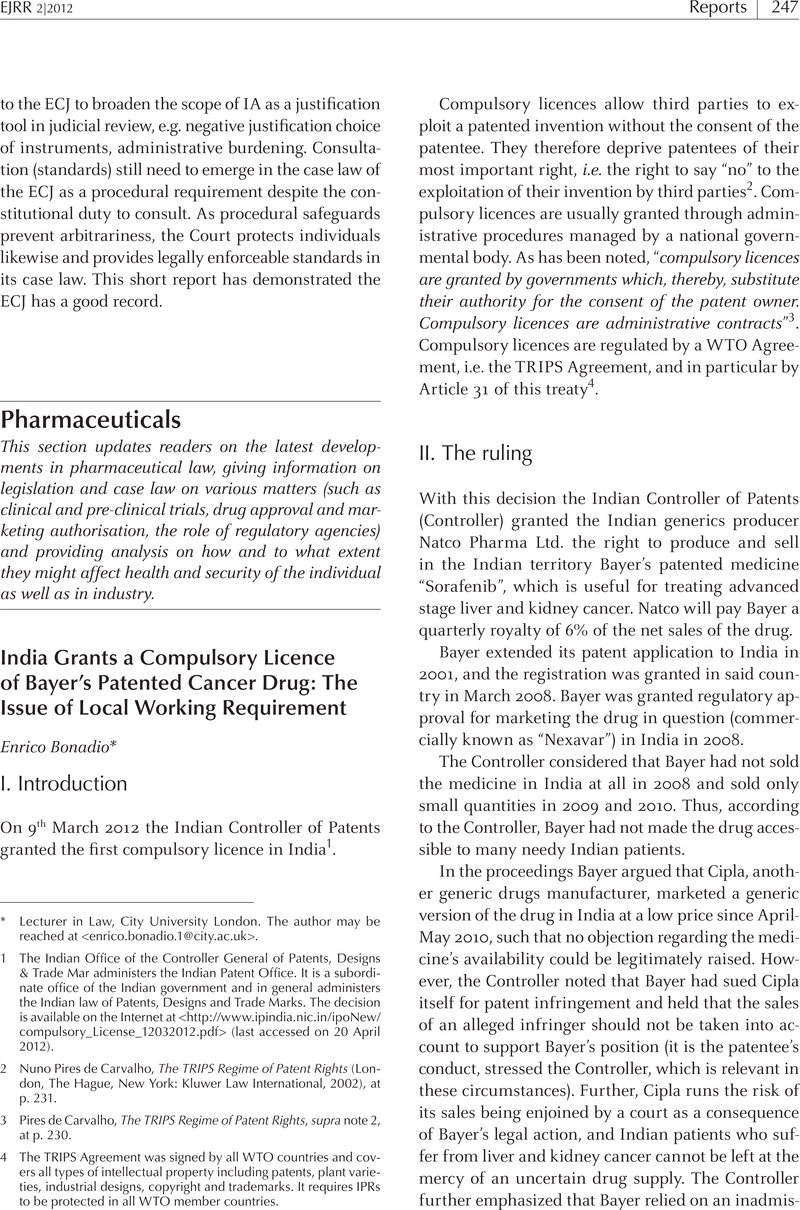Published online by Cambridge University Press: 20 January 2017

1 The Indian Office of the Controller General of Patents, Designs & Trade Mar administers the Indian Patent Office. It is a subordinate office of the Indian government and in general administers the Indian law of Patents, Designs and Trade Marks. The decision is available on the Internet at <http://www.ipindia.nic.in/ipoNew/compulsory_License_12032012.pdf> (last accessed on 20 April 2012).
2 de Carvalho, Nuno Pires, The TRIPS Regime of Patent Rights (London, The Hague, New York: Kluwer Law International, 2002), at p. 231 Google Scholar.
3 Pires de Carvalho, The TRIPS Regime of Patent Rights, supra note 2, at p. 230.
4 The TRIPS Agreement was signed by all WTO countries and covers all types of intellectual property including patents, plant varieties, industrial designs, copyright and trademarks. It requires IPRs to be protected in all WTO member countries.
5 See pp. 11, 15, 20 and 21 of the decision.
6 See p. 36 of the decision.
7 See p. 25 of the decision.
8 See p. 36 of the decision.
9 See p. 30 of the decision.
10 See pp. 35 and 53 of the decision.
11 See p. 35 of the decision.
12 See point a) of the order, p. 60 of the decision.
13 The analysis of the compatibility of the decision with the specific conditions enshrined in Article 31 is outside the scope of this article.
14 See Article 2(1) of TRIPS.
15 See p. 41 of the decision.
16 See p. 45 of the decision.
17 See p. 39 of the decision.
18 See p. 43 of the decision.
19 See also Pires de Carvalho, The TRIPS Regime of Patent Rights, supra note 2, pp. 163–164 (noting that the local working requirement had already been assessed and found in conflict with GATT 1947 provisions on prohibition of quantitative restrictions in the case The United States Manufacturing Clause. The “Manufacturing Clause” (Section 601 of Title 17 of the US Code) prohibited the importation in the US of a copyrighted work which consisted predominantly of non-dramatic literary material in English, whose author was a US domiciliary, unless the portions consisting of such material had been manufactured in the US or Canada).
20 See the report of the WTO Panel of 17 March 2000, para. 7.91, WT/DS114/R.
21 The Doha Declaration was adopted on 14 November 2001 by the WTO Ministerial Conference and strongly reaffirmed the rights of WTO Member States to use the flexibilities envisaged by TRIPS with a view to guaranteeing better access to essential medicines.
22 Case C-235/89, Commission v Italy [1992] ECR I-777, at para. 23.
23 In general, on the use of compulsory licenses in the pharmaceutical field see Gustavo Ghidini, “Developping countries’ access to patented essential drugs: are compulsory licenses the optimal means?”, in Estudias sobre propriedad industrial e intellectual y derecho de la competencia. Colleccion de trabajos en homenaje a Alberto Bercovitz Rodriguez-Cano (Barcelona: 2005).